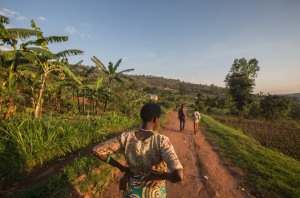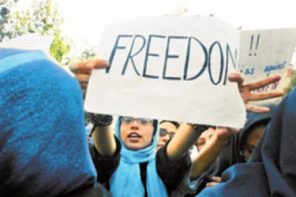1. UNESCO sidestepped thrice-annual criticism of a prize named after Teodoro Obiang, the president of Equatorial Guinea. Pretty much any organization with any sort of awareness of/conscience about human rights anywhere in the world has asked UNESCO to suspend this prize, and it has agreed to do so, two years in a row. That’s because Obiang, according to some reports, is a greedy autocrat whose family is pilfering the wealth of its oil state, the third largest in Africa, while the population of Equatorial Guinea remains, in the AFP’s words, in “grinding poverty.” In response to calls to permanently suspend the prize, UNESCO has insteaded opted to rename it “The International UNESCO-Equatorial Guinea Prize.” Problem solved.
2. Three men were killed in Burundi in an exchange of gunfire with the police, the latest in a series of killings that have been documented intermittently since the country’s troubled 2010 election. The UN has confirmed that the FNL, an ex-rebel group and former opposition party, has relocated to Congo, and some observers fear the ongoing gun battles suggest a return to violence with the FNL.
3. Speaking of: Putin took the Kremlin again, but dozens of opposition politicians won local elections — including a 20-year-old journalism student, proving these skills might still mean something.
5. On International Women’s Day, Kenya’s sex workers offer to pay income tax — to make the point that sex work is as valid as any other work, and to force the government to recognize the practice as a labor. (Kenya, meanwhile, fired 25,000 striking nurses, arguing that nurse strikes endanger patients lives. Twenty-five thousand missing nurses, however, is apparently totally safe.)
6. The International Peace Institute calls our attention to actually underreported topics, namely, security in West Africa. In addition to the notorious drug smuggling, IPI draws attention to the scary combination of terrorism, drugs, crime and insurgency in the Sahel region (especially in Mali, it notes, citing a recent UN assessment) and to piracy in the Gulf of Guinea. (That’s right. Pirates advance on great white saviors. Pirates, checkmate.)
Bonus points for IPI, which tell us what we can do, rather than wring our hands and feel guilty, or not guilty, or guilty about not feeling guilty, or questionable making others feel guilty about the guilt others try to put on them… er… work it out according to whatever made you angriest on the Internet.
So what can we do to stop these two burgeoning crises? Send planes to the Sahel and patrol boats to the Gulf, says IPI. And maybe some radar and comms equipment.
That’s less a matter of political will than a requisition order. Who’s on it? (I know, I know, a request ion requires political will. Yes, yes, clever.)
7. The UN claims to have met the clean water Millennium Development Goal, and scientists rebut. The World Bank says the world met the Millennium Development poverty goal.
8. The maternal mortality MDG, however, looked pretty awful from Gobah, Liberia. Yesterday, I visited a clinic there — in the same county as the capital — that doesn’t have a microscope, malaria meds for kids 5-10, or water. That’s right, water. Read about it over on the project page for our Pulitzer Center collaborative project on reproductive health in Africa later today.
9. Sam Bell, who knows a thing or two (to say the least) about what it means to do American advocacy on African atrocities, wrote a moving tribute to Representative Donald Payne, a long-time Sudan (and Africa) advocate who died on Tuesday. Bell’s tribute is itself an insightful reflection on some of the challenges of advocacy.
10. Ashley Judd listened to this awesome radio piece I did about some incredible Congolese women busting through the countryside to bring women’s news to the airwaves. Did you?
If, after all of this, you’re still thinking about the LRA, I urge you to read this piece by indefatigable Elizabeth Rubin. This piece is from 1998, when the LRA was still in Uganda kidnapping children at night. Not that being in Congo and the CAR and raping women and looting villages is any less of a crime. Just saying, note the time flashback. Also, it’s amazing journalism. (Thanks Nicholas Thompson for freeing it from behind the New Yorker’s paywall.)
Meanwhile, I find these two things to be the most lasting said as the Internet exploded this week.
Photographer Glenna Gordon, who took the only still picture of Invisible Children you’ve ever seen, was interviewed about the photo by the Washington Post. Answering a question about whether this IC stuff is all neo-colonial, Gordon said, “I don’t think they think there is a problem with the idea that they are colonial. This photo is the epitome of it, like, we are even going to hold your guns for you.”
And novelist Teju Cole said yesterday (on, sigh, Twitter): “The White Savior Industrial Complex is not about justice. It is about having a big emotional experience that validates privilege.” All those blog posts, and dude gets it right in 140 characters.




Thank you for posting this information, Jina. I think it is extremely important for all of us to be aware of all the good and bad things happening all around the world. Knowing and understanding these issues in their entirety can help us make informed and intelligent decisions on how to address them going forward.
Your piece on the inspirational Congolese women and their work promoting women’s rights through the radio is outstanding. It makes me proud to be a woman and a journalist. Keep up the great work!
Hi Steph, It is nice to read your informative articles here at this site. Keep it up and more interesting stories to write. Edwin Verances Philippines